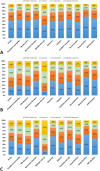Is there still hesitancy towards SARS-CoV-2 vaccination among people with neurological disease- a survey of the NeuroCOVID-19 task force of the European Academy of Neurology
- PMID: 39903350
- PMCID: PMC11920348
- DOI: 10.1007/s10072-025-08017-w
Is there still hesitancy towards SARS-CoV-2 vaccination among people with neurological disease- a survey of the NeuroCOVID-19 task force of the European Academy of Neurology
Abstract
Background: An online 3-item survey was sent to the European Academy of Neurology (EAN) community and inquired about the persistence of SARS-CoV-2 vaccination skepticism and the underlying thoughts and factors restricting vaccine use among patients with neurological conditions.
Results: We obtained 616 responses from 84 countries, predominantly from Europe. In the view of the treating neurologist, patients with multiple sclerosis (MS), neuroimmunological disorders (ND), and chronic neurological infections continued to have high levels of skepticism toward SARS-CoV-2 vaccination. Patients with MS/ND were quoted as the most hesitant group, with 60% of the respondents sharing this impression. The patient group perceived as most confident towards immunization against COVID-19 and with the lowest level of distrust towards the vaccine were those with sleep disorders. For all other conditions, perceived distrust ranged between 42 and 52%. Fear of adverse events of vaccination or disease reactivation was perceived by 87% of patients with MS/ND and more than 70% of patients with stroke/vascular neurology, neuromuscular disorders, chronic neurological infections, and peripheral neuropathy. Patients with sleep disorders (54%), autonomic disorders (46%), movement disorders (43%), and dementia (43%) were sensed as less fearful of vaccine-related adverse events.
Conclusion: Despite the large body of evidence proving the efficacy and safety of SARS-CoV-2 vaccination, patients with certain neurological disorders still have a surprisingly high percentage of distrust and fear of adverse events. Our observations emphasize the importance of continuous evidence-based information delivery and patient education by treating neurologists.
Keywords: Autoimmune; COVID-19; Disease prevention; Multiple sclerosis; Neurological disease; Public health; SARS-CoV-2; Vaccination hesitancy.
© 2025. The Author(s).
Conflict of interest statement
Declarations. Ethical approval: No ethics approval was required for this anonymized online survey study according to Austrian regulations. Conflict of interest: All authors are members of the NeuroCOVID-19 Task Force of the European Academy of Neurology. No further competing interests.
Figures




References
-
- News UN WHO chief declares end to COVID-19 as a global health emergency 2023 [April 4 2024]. Available from: https://news.un.org/en/story/2023/05/1136367
-
- Fanciulli A, Leys F, Krbot Skoric M, Carneiro DR, Calandra-Buonaura G, Camaradou J et al (2023) Impact of the COVID-19 pandemic on clinical autonomic practice in Europe A survey of the European Academy of Neurology (EAN) and the European Federation of Autonomic Societies (EFAS). Eur J Neurol:Online Ahead Print. 10.1111/ene.15787 - PubMed
MeSH terms
Substances
LinkOut - more resources
Full Text Sources
Medical
Miscellaneous

